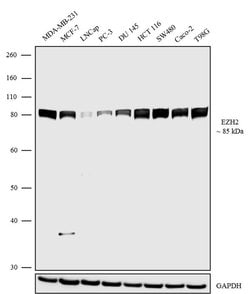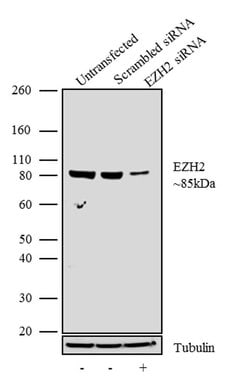Learn More
Invitrogen™ EZH2 Recombinant Rabbit Monoclonal Antibody (8H32L43)
Rabbit Recombinant Monoclonal Antibody
Supplier: Invitrogen™ 702492
Description
This antibody is predicted to react with Monkey, Rat, Horse, Mouse Recombinant rabbit monoclonal antibodies are produced using in vitro expression systems. The expression systems are developed by cloning in the specific antibody DNA sequences from immunoreactive rabbits. Then, individual clones are screened to select the best candidates for production. The advantages of using recombinant rabbit monoclonal antibodies include: better specificity and sensitivity, lot-to-lot consistency, animal origin-free formulations, and broader immunoreactivity to diverse targets due to larger rabbit immune repertoire.
EZH2 (Histone-lysine N-methyltransferase) is a member of the Polycomb-group (PcG) family. PcG family members form multimeric protein complexes, which are involved in maintaining the transcriptional repressive state of genes over successive cell generations. This protein associates with the embryonic ectoderm development protein, the VAV1 oncoprotein, and the X-linked nuclear protein. EZH2 may play a role in the hematopoietic and central nervous systems. Mutations affecting EZH2 can cause Weaver syndrome (WVS).
Specifications
| EZH2 | |
| Recombinant Monoclonal | |
| 0.5 mg/mL | |
| PBS with 0.09% sodium azide; pH 7.4 | |
| Q15910 | |
| EZH2 | |
| Protein corresponding to human EZH2 (aa156-aa265). | |
| 100 μg | |
| Primary | |
| Human | |
| Antibody | |
| IgG |
| Western Blot | |
| 8H32L43 | |
| Unconjugated | |
| EZH2 | |
| an; enhancer of zeste 2 polycomb repressive complex 2 subunit; enhancer of zeste homolog 2; enhancer of zeste homolog 2 (Drosophila); ENX 1; ENX1; Enx-1; Enx1h; EZH 2; EZH1; EZH2; EZH-2; EZH2b; histone-lysine N-methyltransferase EZH2; KMT6; KMT6A; lysine N-methyltransferase 6; mKIAA4065; OTTHUMP00000213774; OTTHUMP00000213778; OTTHUMP00000213779; OTTHUMP00000213780; WVS; WVS2 | |
| Rabbit | |
| Protein A | |
| RUO | |
| 2146 | |
| Store at 4°C short term. For long term storage, store at -20°C, avoiding freeze/thaw cycles. | |
| Liquid |
Your input is important to us. Please complete this form to provide feedback related to the content on this product.

